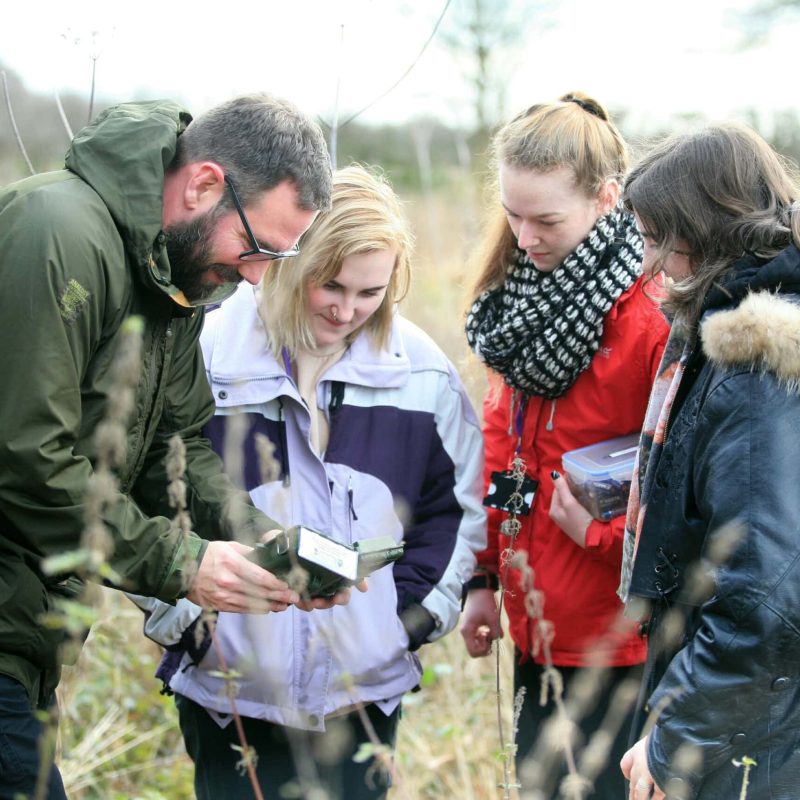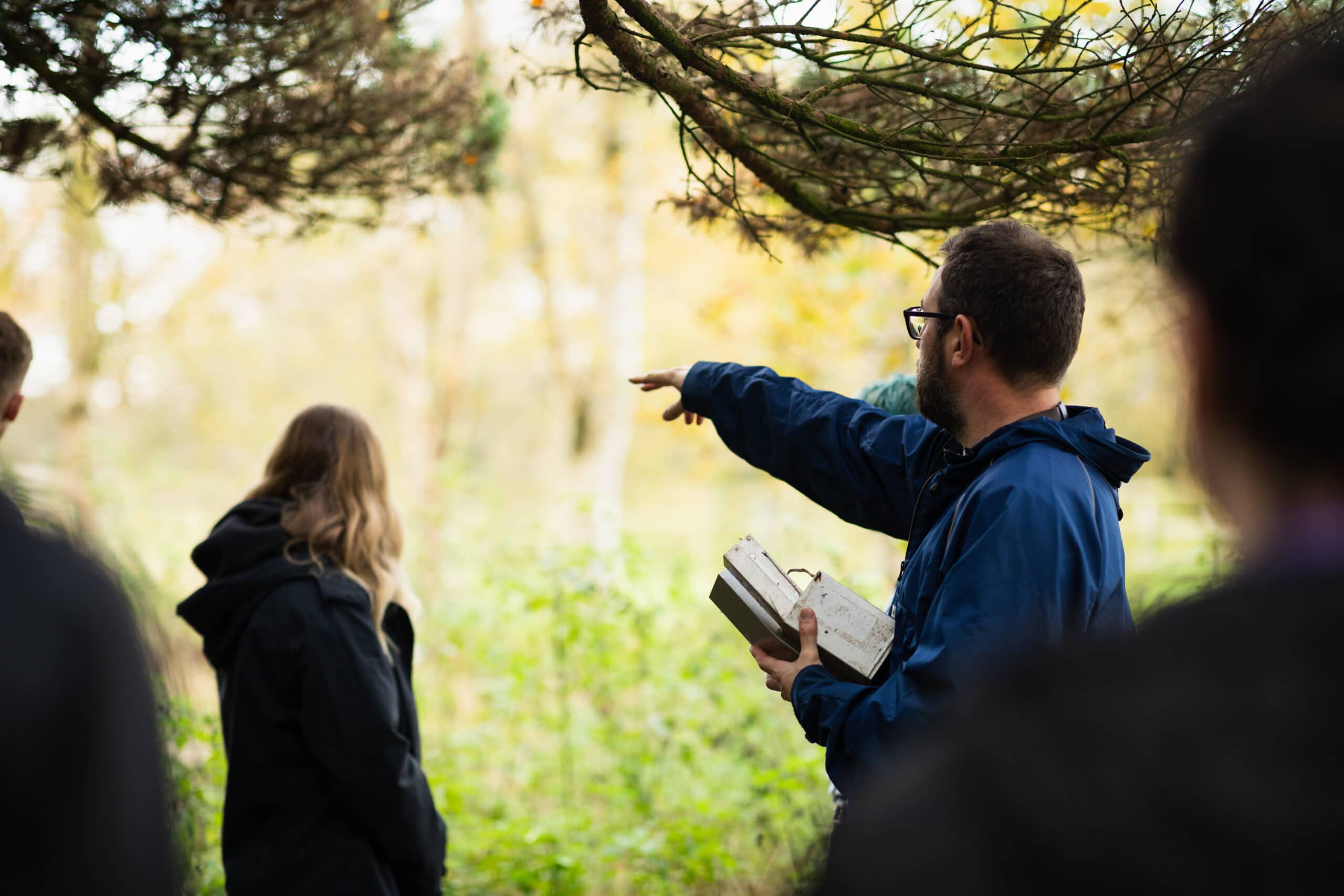We live in a rapidly changing world. If you feel your purpose in life is to safeguard our environment and you have a desire to share your passion with others, we can help you to achieve your goals.
With plenty of hands-on practical management of our stunning 330-hectare campus, this course will provide you with all the industry-focused skills and knowledge you need to ensure you can pursue your passion to make a positive difference to our environment.


You will access a mosaic of habitats including native woodland, wetlands, grasslands and wildflower meadows hosting endangered species such as otters, great created newts, stoats, earth stars, great burnet and many more.
Flexible study routes, including part-time courses, are ideal if you are looking to change your career or return to education.


UCR Environmental Science undergrads conduct survey on a
Site of Special Scientific Interest.
This course gives you the opportunity to study the science behind the environmental processes that shape and influence our environment, and examine the impact on both the natural and man-made worlds. You will be able to develop your personal and academic skills, as well as gain specific knowledge and practical skills that are essential for a career in the environmental science/conservation sectors.
The course is comprised of 16 modules spread over 2 years of study.
A minimum of 64 UCAS points from one of, or a combination of, the qualifications below, ideally in a science-based or relevant subject:
Please note: we accept a maximum of 20 UCAS points from GCE AS Levels and that the Welsh Baccalaureate (core) and A Level General Studies will be recognised in our offer. We will also consider a combination of A Levels and BTECs/OCRs.
Non-standard entry: applicants aged 21 years of age or over without standard academic qualifications may be able to demonstrate considerable vocational experience and transferable skills. Their applications will be viewed on an individual basis to assess suitability. Any applicant who has not received certification for prior learning experiences, but has worked within the discipline, will also be considered. In some instances, applicants may be asked to attend an interview or complete a written assessment to support their application.
Contextualised Admissions: to support access and participation in Higher Education, University Centre Reaseheath operates a contextualised admissions policy, which allows reduced offers to be made to students with certain characteristics and/or social background. Further information can be found in the UCR Contextualised Admissions Policy, available on the website.
International Students: This course is not accepting applications from students requiring sponsorship for a Student visa. If you do not require sponsorship please contact UCRAdmissions@reaseheath.ac.uk for further information.
Level 5 modules involve far greater detail and depth of knowledge to reinforce existing knowledge and further enhance key concepts and skills.
*Optional modules
The final module is a choice of one of two optional units related to gaining work experience.
Please note that availability of optional modules is subject to availability of subject-specialist staff and the recruitment of the minimum viable student number (7 individuals). Should a module not be deemed viable for operation then all students whom selected for that module will be communicated to in writing in advance of the academic year, and will be informed of the alternative options available to select from.
Students will be expected to make their module choices for the following academic year during March/April, via on online module selection service. Confirmation of module selections will be provided via email following approval.
Overall workload
Your overall workload consists of class contact hours, independent learning and assessment activity, plus field trips. Your actual contact hours may depend on which optional modules you select, but the following information gives an indication of how much time you will need to allocate to different activities at each year of the course:
Year 1:
30% of your time is spent in timetabled teaching and learning activity
Teaching, Learning and Assessment: 360 hours
Independent Study: 840 hours
Year 2:
20% of your time is spent in timetabled teaching and learning activity
Teaching, Learning and Assessment: 288 hours
Placement: 100 hours
Independent Study: 812 hours
Cohort sizes vary and can be up to 15 students. Some units are taught with other cohorts.
Assessment Methods
Assessments are designed to encourage both academic skills and skills valued in the workplace. They include a combination of coursework and timed online assessments. Coursework may take many forms including: essays, reports, data processing, presentations, academic posters, seminar discussions, interviews, critical reviews, portfolios of evidence and practical competency assessments. The timed online assessments vary, depending on the nature of the module, but may take the form of multiple-choice papers, essays, practical assessments, data handling questions, short answer quizzes, and in class examinations.
The balance of assessment by timed online assessment by coursework depends to some extent on the optional modules you choose. The approximate percentage of the course assessed by coursework is as follows:
Year 1
80% coursework
20% timed online assessment
Year 2
80% coursework
20% timed online assessment
Feedback
Feedback is supplied not only on assignments but also throughout the course in several ways. These include Turnitin, directly from module leaders, through one to one and group tutorials, during lessons and will be both oral or written. The majority of submissions for assessment are made via Turnitin and feedback for coursework is provided within twenty working days after the submission date.
For summative assessments, written feedback will be supported verbally should the student require clarification. Formative assessment feedback will be provided at the time of completion where possible, with more detailed summative feedback for reports.
Students will be able to access course timetables for the academic year in September.
Timetables are subject to change, but most students can expect to spend 3-3.5 days per week on campus.
UCR Environmental Conservation undergrads conduct a survey on a site of special scientific interest.
Students are given the opportunity to study an optional module at level 5 (year 2) entitled Work Based Learning for the Land Based Industries.
Students are expected to source their own placement, and complete a minimum of 150 hours of work, which can be accrued either in a block or cumulatively over weekends and holiday periods. When selecting a placement, students should consider the financial implications associated with accommodation, travel/commuting and the possible need for a Disclosure Barring Service (DBS) check, as UCR is unable to subsidise such costs.
Tuition Fees
As a student at UCR, you will have two main costs to meet; your tuition fees and living costs.
Our full-time tuition fees for UK and EU students, entering University, can be found on our student finance page. These fees are charged for each academic year of a course and are set by the college annually.
Tuition fees for international students can also be found on our student finance page.
Additional Costs
It is strongly recommended that students have an up-to-date tetanus vaccination record before starting this course.
Reading lists are provided for each module studied and some students chose to purchase key texts.
Students will have the option to undertake overseas study for academic credit in year 2 of the programme, or simply participate for experiential purposes. These may include opportunities to undertake conservation field courses within locations such as Southern Africa, South America and the UK.
The main emphasis placed on these field courses is the development of professional, industry relevant skills and the application of students’ knowledge in a novel, stimulating, yet challenging environment. Costs associated with the field courses range from £500 – £1000 (UK & Europe), and between £2,200 – £2,800 (South America & Southern Africa). Please note that precise pricing of all field courses is subject to change, pending availability and recruitment.
Equipment Costs
Prices of equipment are subject to change dependent on retailer.
FEC1
Before applying, please visit our Apply Now page for further information
A minimum of 64 UCAS points
September 2026
Full-time: 2 years
Here you will find useful information about the services and support available at University Centre Reaseheath. Click to expand each item:
University Centre Reaseheath is committed to providing additional financial support to those who need it. To find out about the bursary schemes available visit the additional financial support pages.
For students to get the best out of their time at University Centre Reaseheath, we must both recognise that we owe obligations to each other. These obligations are set out in our UCR Student Contract. Before you accept an offer of a place at University Centre Reaseheath, it is important that you read these contract conditions. If you are going to be living in Halls of Residence, you will also need to read the Student Accommodation Licence Conditions. Both of these contracts can be found here.
Click here to view the University Centre Reaseheath Student Protection Plan.
All UCR students are given the opportunity to apply for residential accommodation. First year students are guaranteed accommodation and this offer is made to all applicants who live more than a reasonable daily travelling distance from Reaseheath (providing you have applied before the UCAS equal considerations deadline. For full details on our halls of residence visit our accommodation page.
We have a team of dedicated professionals on hand to offer you support. These include our Student Services Team, Inclusive Learning Team, Library and Learning Resources Team and the Reaseheath Careers Service. You can find more information on the support provided at Reaseheath on our support page.
University Centre Reaseheath is proud to welcome international students. For more information, please visit our international students page.